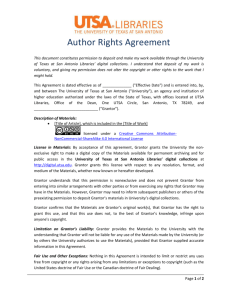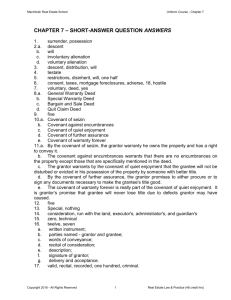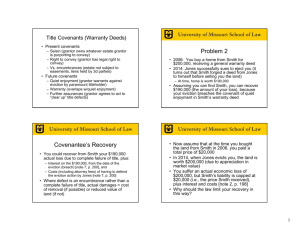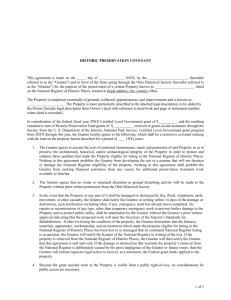Revenue Ruling Confirms Grantor Trust Benefits
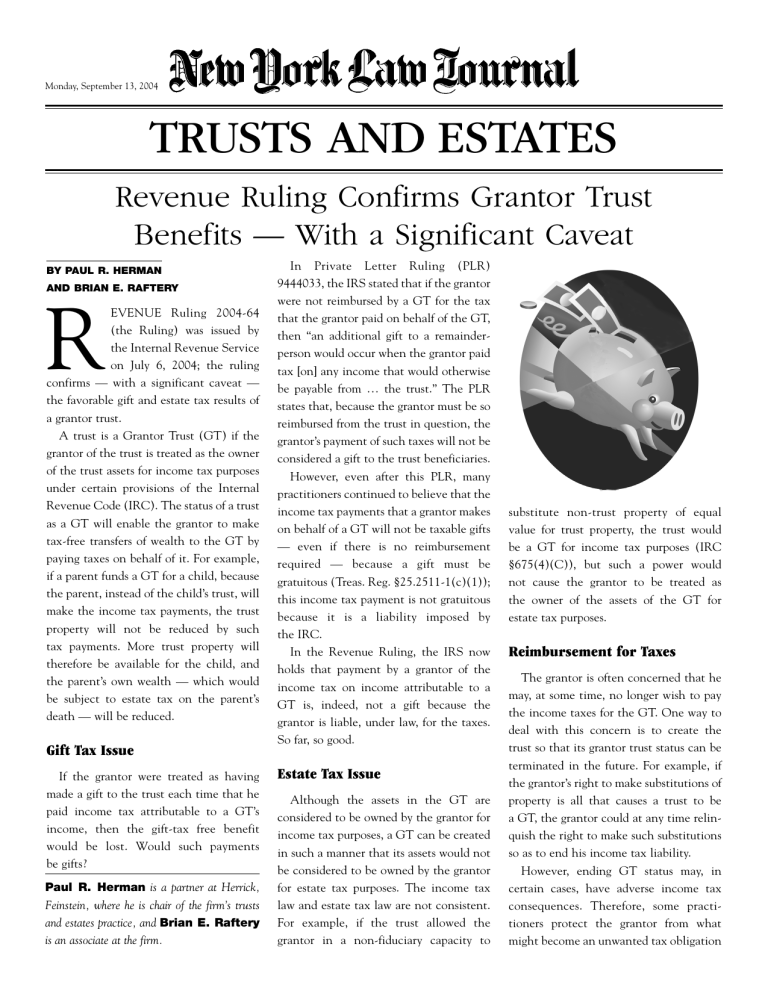
Monday, September 13, 2004
TRUSTS AND ESTATES
BY PAUL R. HERMAN
AND BRIAN E. RAFTERY
R
Revenue Ruling Confirms Grantor Trust
Benefits — With a Significant Caveat
EVENUE Ruling 2004-64
(the Ruling) was issued by the Internal Revenue Service on July 6, 2004; the ruling confirms — with a significant caveat — the favorable gift and estate tax results of a grantor trust.
A trust is a Grantor Trust (GT) if the grantor of the trust is treated as the owner of the trust assets for income tax purposes under certain provisions of the Internal
Revenue Code (IRC). The status of a trust as a GT will enable the grantor to make tax-free transfers of wealth to the GT by paying taxes on behalf of it. For example, if a parent funds a GT for a child, because the parent, instead of the child’s trust, will make the income tax payments, the trust property will not be reduced by such tax payments. More trust property will therefore be available for the child, and the parent’s own wealth — which would be subject to estate tax on the parent’s death — will be reduced.
Gift Tax Issue
If the grantor were treated as having made a gift to the trust each time that he paid income tax attributable to a GT’s income, then the gift-tax free benefit would be lost. Would such payments be gifts?
Paul R. Herman is a partner at Herrick,
Feinstein, where he is chair of the firm’s trusts and estates practice, and Brian E. Raftery is an associate at the firm.
In Private Letter Ruling (PLR)
9444033, the IRS stated that if the grantor were not reimbursed by a GT for the tax that the grantor paid on behalf of the GT, then “an additional gift to a remainderperson would occur when the grantor paid tax [on] any income that would otherwise be payable from … the trust.” The PLR states that, because the grantor must be so reimbursed from the trust in question, the grantor’s payment of such taxes will not be considered a gift to the trust beneficiaries.
However, even after this PLR, many practitioners continued to believe that the income tax payments that a grantor makes on behalf of a GT will not be taxable gifts
— even if there is no reimbursement required — because a gift must be gratuitous (Treas. Reg. §25.2511-1(c)(1)); this income tax payment is not gratuitous because it is a liability imposed by the IRC.
In the Revenue Ruling, the IRS now holds that payment by a grantor of the income tax on income attributable to a
GT is, indeed, not a gift because the grantor is liable, under law, for the taxes.
So far, so good.
Estate Tax Issue
Although the assets in the GT are considered to be owned by the grantor for income tax purposes, a GT can be created in such a manner that its assets would not be considered to be owned by the grantor for estate tax purposes. The income tax law and estate tax law are not consistent.
For example, if the trust allowed the grantor in a non-fiduciary capacity to substitute non-trust property of equal value for trust property, the trust would be a GT for income tax purposes (IRC
§675(4)(C)), but such a power would not cause the grantor to be treated as the owner of the assets of the GT for estate tax purposes.
Reimbursement for Taxes
The grantor is often concerned that he may, at some time, no longer wish to pay the income taxes for the GT. One way to deal with this concern is to create the trust so that its grantor trust status can be terminated in the future. For example, if the grantor’s right to make substitutions of property is all that causes a trust to be a GT, the grantor could at any time relinquish the right to make such substitutions so as to end his income tax liability.
However, ending GT status may, in certain cases, have adverse income tax consequences. Therefore, some practitioners protect the grantor from what might become an unwanted tax obligation
NEW YORK LAW JOURNAL MONDAY, SEPTEMBER 13, 2004 by providing a discretion for the trustee of a GT to reimburse the grantor for taxes the grantor paid on behalf of the GT — either by an express provision in the trust agreement, or by not overriding a statutory provision which would allow discretionary tax reimbursement to the grantor of the GT. Such discretion raises estate tax issues.
The Ruling addresses estate tax consequences of three situations.
Situation 1: Neither state law nor the trust agreement requires or permits reimbursement of the grantor for taxes paid.
In this situation, the IRS ruled that none of a GT’s assets would be included in the grantor’s estate. The IRS reasoned that the grantor did not retain the right to have trust property expended in discharge of his legal obligation.
Situation 2: The trust agreement provides that the trustee must reimburse the grantor for taxes paid.
In this situation, the IRS ruled that all of the trust assets would be included in the grantor’s estate because the grantor retained the right to have trust assets expended in discharge of his legal obligation.
With respect to Situation 2, the Ruling states that the IRS will not apply the
Ruling to cause estate tax inclusion with respect to any trust created before Oct. 4,
2004. The IRS apparently so ruled so as to not prejudice taxpayers who included mandatory tax reimbursement provisions because the IRS, in prior PLRs, led practitioners to believe that such provisions were necessary to avoid taxable gift treatment for a grantor’s payments of taxes for a GT. (The Situation 1 and
Situation 3 rulings are applicable to all trusts, whenever created.)
Situation 3: The trust agreement provides that the trustee may, in discretion, reimburse the grantor for income taxes he paid.
It has long been understood that a trustee’s discretion to reimburse the grantor for income taxes which are attributable to the trust income, by itself, should not cause estate tax inclusion of trust assets.
1 If a trustee could, but is not required to, give back property to the grantor, then such discretionary right should not cause estate tax inclusion of the trust’s property in the grantor’s estate.
The IRS confirmed this principle in the Ruling.
The Caveat
Does the ruling in Situation 3 mean that a discretionary tax reimbursement provision can safely be included in a GT?
The answer is no. The Ruling states that a trustee’s discretion to reimburse a grantor for his tax liability would “not alone cause the inclusion of the trust in … [the grantor’s] gross estate ….” But the Ruling adds an important caveat: Such discretion
“combined with other facts … may cause inclusion….” One of the examples of such
“other facts” is: “applicable local law subjecting the trust assets to the claims of
A’s [the grantor’s] creditors.”
Creditors’ Claims
If a grantor’s creditors could reach the trust assets, it is as if the grantor retained the power to revoke the trust, and such trust would be included in his estate for estate tax purposes.
2 (It does not matter that the grantor does not have creditors, or that creditors, if any, could be fully paid from the grantor’s own personal assets.)
Under the statutory law of most states, even if a trust merely permits a trustee to make payments to the grantor, the creditors of the grantor can reach assets of the trust. This is also New York law, so there are estate tax inclusion issues.
New York Law
Section 7-3.1 of the New York Estates,
Powers and Trusts Law (EPTL) provides in pertinent part:
A disposition in trust for the use of the creator [of the trust] is void as against the existing or subsequent creditors of the creator.
In Situation 3 of the Ruling, the trustee is allowed to reimburse the grantor for taxes. If such discretionary reimbursement provision would cause the trust to be a
“disposition … for the use of” the grantor,
------------------------------------------------
Until it is clear that EPTL §7-3.1 will not apply to a discretionary tax reimbursement provision, a cautious practitioner should not prepare a GT which expressly authorizes tax reimbursement. In addition, the cautious practitioner should provide that EPTL §7-1.11, the permissive statutory tax reimbursement provision, should not be applicable to the GT.
-----------------------------------------------trust assets would likely be subject to the claims of the grantor’s creditors.
In PLR 8213004 (Dec. 7, 1981) and
PLR 7833062 (May 18, 1978), the IRS accepted the proposition that EPTL
§7-3.1 applies to a trust only if the trust is for the “exclusive” use of the grantor, and, therefore, EPTL §7-3.1 would not apply to a trust with beneficiaries other than the grantor. If this “exclusive” use proposition is a correct statement of New York law, there should be no concern about estate tax inclusion when a GT has other beneficiaries because the trust would not be for the “exclusive” benefit of the grantor.
However, subsequent to the above
PLRs, a New York Appellate Division court construed EPTL §7-3.1 differently.
Vanderbilt Credit Corp. v. Chase Manhattan
Bank , 100 A.D.2d 544, 473 N.Y.S.2d 242
NEW YORK LAW JOURNAL MONDAY, SEPTEMBER 13, 2004
(2d Dept. 1984). In Vanderbilt , the court held that creditors could reach a trust where the trustee had discretion to pay income and principal to the grantor and, on her death, the remaining principal was to be paid to the grantor’s children. The court so held even though there was a beneficiary or beneficiaries other than the grantor — albeit only after the grantor’s death. Furthermore, in the Vanderbilt case, the discretionary payments to the grantor are recited to be provisions of the trust “in part,” and there may have been authorizations, even during the grantor’s lifetime, to make use of the trust property for persons other than the grantor.
Furthermore, in United Presbyterian
House v. Lincks , N.Y.L.J., March 3, 2003, at p. 28, col. 4 (Sup. Ct., Nassau Co.), the court, citing EPTL §7-3.1, among other authorities, granted a creditor of the grantor of a trust summary judgment to compel payment from the trust to the creditor even though (1) the grantor was only permitted to be paid from the trust one-half of the income for her maintenance and benefit; and (2) there were several other beneficiaries of the trust.
Thus, because of New York court decisions subsequent to the above
PLRs, the IRS might now reach the conclusion that a trust can be reached by creditors even though the trust is not for the exclusive use of the grantor. But a trust which gives the trustee discretion only to reimburse the grantor for income taxes attributable to trust assets might still not be found to be a “disposition in trust for the use of the creator [of the trust]” within the meaning of EPTL
§7-3.1.
One could argue that at the time that the predecessor statute to EPTL §7-3.1
was enacted, there were no GT tax issues.
Therefore, the Legislature did not contemplate or intend that a trust with a trustee’s discretion to reimburse a grantor for tax payments would be considered to be a “disposition in trust for the use of the creator [of the trust].” Such reimbursement only serves to make the grantor whole after he has expended his own funds on behalf of the trust.
If the discretion to reimburse is not expressly stated in a GT, it may nevertheless exist because EPTL §7-1.11 provides that a trustee, “unless otherwise provided in [the trust agreement] …, may, from time to time, pay from principal to the creator of such trust an amount equal to any income taxes on any portion of the trust principal with which he is charged.”
In such a case, it can be argued that EPTL
§7-3.1 does not apply to discretion under
EPTL §7-1.11 because that was not the intent of the New York legislature.
EPTL §7-1.11, which was enacted subsequent to EPTL §7-3.1, was to be of assistance to taxpayers dealing with the burden of paying the taxes due because of a GT, and it would not have been the legislature’s intent to have EPTL §7-1.11
cause a trust to be exposed to creditors.
Further, the “disposition” for the use of the grantor is, in the case of EPTL
§7-1.11, caused by state statute and not the grantor.
Nevertheless, the risk remains that the IRS may make use of EPTL §7-3.1 in conjunction with either (1) an express discretion for tax reimbursement or (2)
EPTL §7-1.11, to include GT assets in the estate of a grantor.
Recommendations
Practitioners must decide how best to take into account the above issues when drafting GT agreements.
Until it is clear that EPTL §7-3.1 will not apply to a discretionary tax reimbursement provision, a cautious practitioner should not prepare a GT which expressly authorizes tax reimbursement. In addition, the cautious practitioner should provide that EPTL §7-1.11, the permissive statutory tax reimbursement provision, should not be applicable to the GT.
The estate tax risk can be avoided by applying to the IRS for a PLR. If the PLR is granted, then the IRS would be foreclosed from later arguing for inclusion of the trust property in the grantor’s estate.
However, in view of the Vanderbilt and
United Presbyterian cases, the IRS may change its view of New York law.
The law of most states is similar to New
York’s law regarding creditors’ rights to reach assets in a trust where the grantor can benefit from that trust. However, some states have by statute changed their laws to eliminate, at least to some degree, this rule, e.g., Alaska and Delaware. If a grantor trust were to be governed by the law of such a state, the grantor’s creditors may not be able to reach the assets in the trust, and there may then be no estate tax inclusion issue.
The New York legislature would greatly benefit grantors of New York trusts if it would enact an addition to EPTL §7-3.1
stating that EPTL §7-3.1 was never intended to, and will not, apply to the mere discretion of a trustee to reimburse a grantor for income tax, attributable to trust income, and actually paid by the grantor, whether such discretion is expressly provided in the trust instrument or by EPTL §7-1.11. With such legislation in place, discretionary tax reimbursement provisions can be used without concern that the IRS would include assets of such trust in the grantor’s estate.
••••••••••••••
•
•
•
••••••••••••••
1. See, Commissioner v. Est. of Douglas , 143 F.2d 961
(3d Cir. 1944), acq. 1944 C.B. 7; Estate of Mitchell v.
Comm’r , 55 T.C. 576 (1970), acq. 1971-2 C.B. 3.
2. See Rev. Rul. 76-103, 1976-1 C.B. 293; Paxton v.
Comm'r , 86 T.C. 785, 814-819 (1986).
This article is reprinted with permission from the
September 13, 2004 edition of the NEW YORK
LAW JOURNAL. © 2004 ALM Properties, Inc.
All rights reserved. Further duplication without permission is prohibited. For information, contact
American Lawyer Media, Reprint Department at
800-888-8300 x6111. #070-09-04-0010
